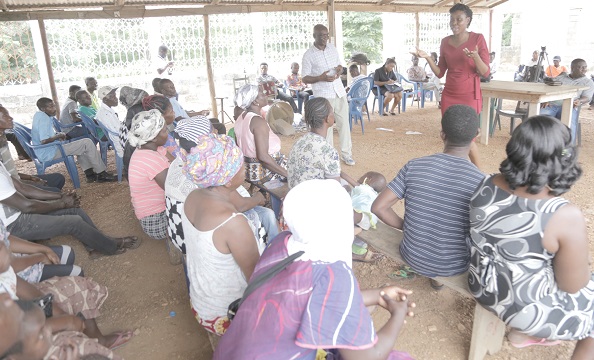
Standards Authority sensitises farmers to aflatoxin prevention
The Ghana Standards Authority (GSA) has started a nationwide sensitisation programme for farmers on how to prevent aflatoxin contamination and its negative impact on human lives.
Aflatoxins are toxins produced by certain fungi that are found on agricultural crops such as maize, peanuts, cottonseed and tree nuts.
Advertisement
They attack the crops throughout the production chain, especially when non-resistant seeds are used for planting without proper cultural practices and good storage mechanisms.
When foods contaminated with aflatoxins are consumed, they pose health challenges such as liver cancer, damage to foetuses, stunted growth in children, immune suppression and, in extreme cases death.
GSA action
Towards addressing those challenges, the GSA has secured a $250,000 grant from the Alliance for Green Revolution in Africa (AGRA) for a two-year awareness creation programme for stakeholders in the agricultural sector, especially farmers.
Since the project started in March this year, the authority has already reached out to more than 5,000 farmers in the Upper East, Upper West,
Northern, Eastern and Bono regions where cereals are produced on a large scale.
Collaboration
At one of such sensitisation outreaches at Asebi in the Shai Osudoku District in the Greater Accra Region yesterday, the Business Development
Manager of the GSA, Mr George Kojo Anti, explained that the authority was collaborating with the Ministry of Food and Agriculture (MoFA), the
Council for Scientific and Industrial Research (CSIR), the University for Development Studies (UDS) and other stakeholders to ensure that the sensitisation programme was successful.
He said the project had so far exceeded its target of reaching 5,000 farmers by the end of this year.
"The responses from the farmers have been so encouraging so we will continue with the programme to other parts of the country.
"What we realised is that the extent of the problem is far bigger than something that can be solved with $250,000 so when this project ends in 2020, we will have to seek more funds for more to be done," he said.
Mr Anti noted that the project was important, particularly when there was the need for proper storage of bumper harvest that was expected this year.
The Ghana Standards Authority (GSA) has started a nationwide sensitisation programme for farmers on how to prevent aflatoxin contamination and its negative impact on human lives.
Aflatoxins are toxins produced by certain fungi that are found on agricultural crops such as maize, peanuts, cottonseed and tree nuts.
They attack the crops throughout the production chain, especially when non-resistant seeds are used for planting without proper cultural practices and good storage mechanisms.
When foods contaminated with aflatoxins are consumed, they pose health challenges such as liver cancer, damage to foetuses, stunted growth in children, immune suppression and, in extreme cases death.
GSA action
Towards addressing those challenges, the GSA has secured a $250,000 grant from the Alliance for Green Revolution in Africa (AGRA) for a two-year awareness creation programme for stakeholders in the agricultural sector, especially farmers.
Since the project started in March this year, the authority has already reached out to more than 5,000 farmers in the Upper East, Upper West,
Northern, Eastern and Bono regions where cereals are produced on a large scale.
Collaboration
At one of such sensitisation outreaches at Asebi in the Shai Osudoku District in the Greater Accra Region yesterday, the Business Development Manager of the GSA, Mr George Kojo Anti, explained that the authority was collaborating with the Ministry of Food and Agriculture (MoFA), the Council for Scientific and Industrial Research (CSIR), the University for Development Studies (UDS) and other stakeholders to ensure that the sensitisation programme was successful.
He said the project had so far exceeded its target of reaching 5,000 farmers by the end of this year.
"The responses from the farmers have been so encouraging so we will continue with the programme to other parts of the country.
"What we realised is that the extent of the problem is far bigger than something that can be solved with $250,000 so when this project ends in 2020, we will have to seek more funds for more to be done," he said.
Mr Anti noted that the project was important, particularly when there was the need for proper storage of bumper harvest that was expected this year.
Caution
The Deputy Technical Manager at the Mycotoxin Laboratory at the GSA, Ms Araba Incoom, urged the farmers to use improved seed varieties and also adopt good agronomic practices on their farms to prevent aflatoxin contamination of their produce.
She also advised members of the public to treat cereals properly before consumption.
Ms Incoom stressed that given how fatal aflatoxins could be, all stakeholders needed to support the sensitisation project to help deal with the challenge.
The Deputy Technical Manager at the Mycotoxin Laboratory at the GSA, Ms Araba Incoom, urged the farmers to use improved seed varieties and also adopt good agronomic practices on their farms to prevent aflatoxin contamination of their produce.
She also advised members of the public to treat cereals properly before consumption.
Ms Incoom stressed that given how fatal aflatoxins could be, all stakeholders needed to support the sensitisation project to help deal with the challenge.




